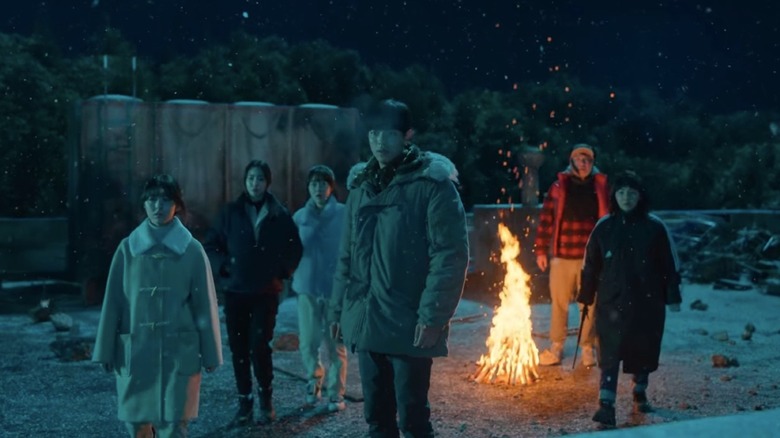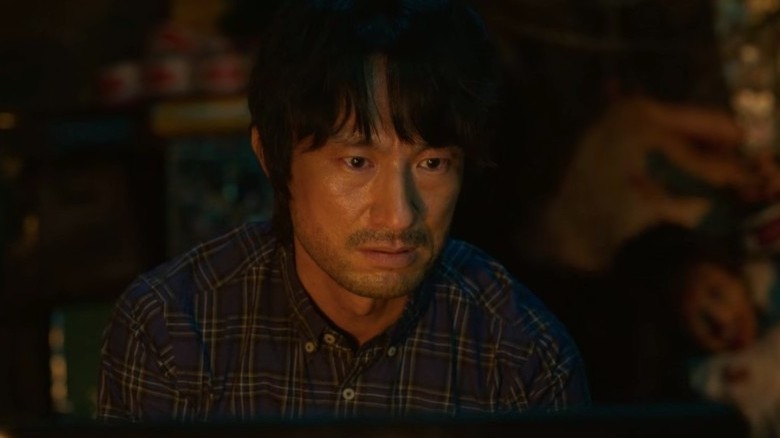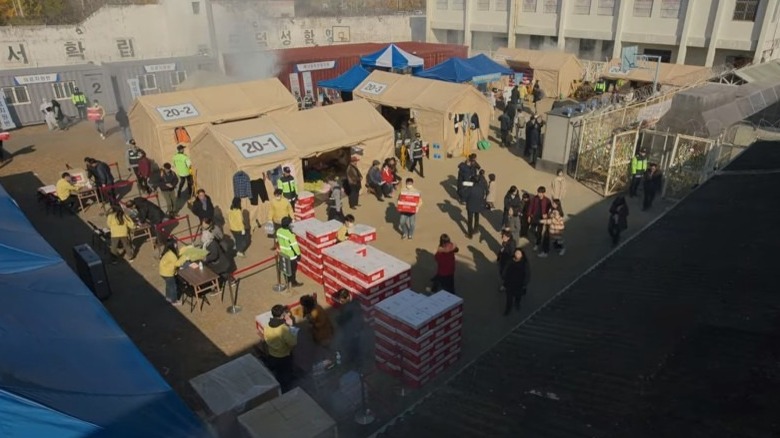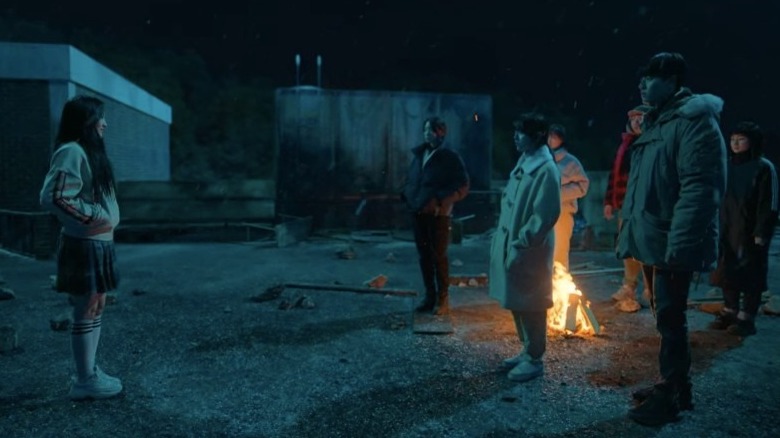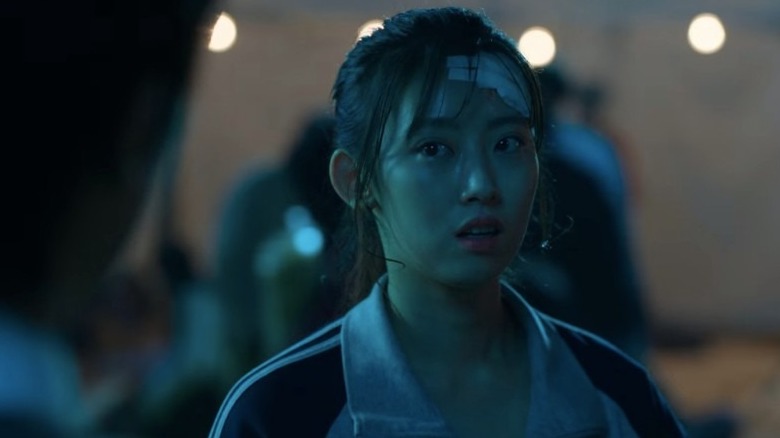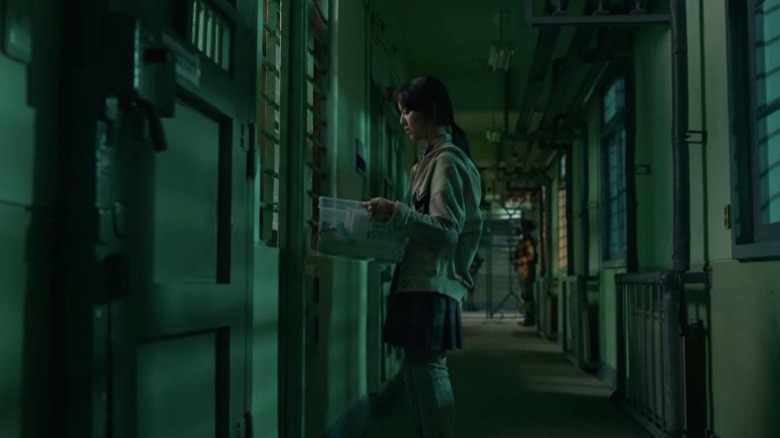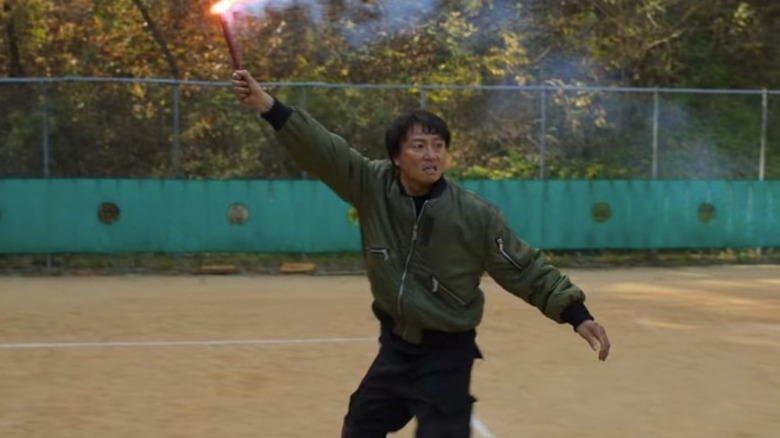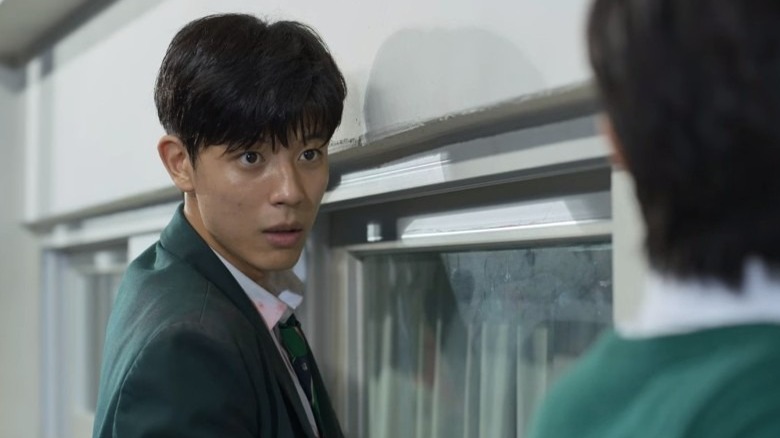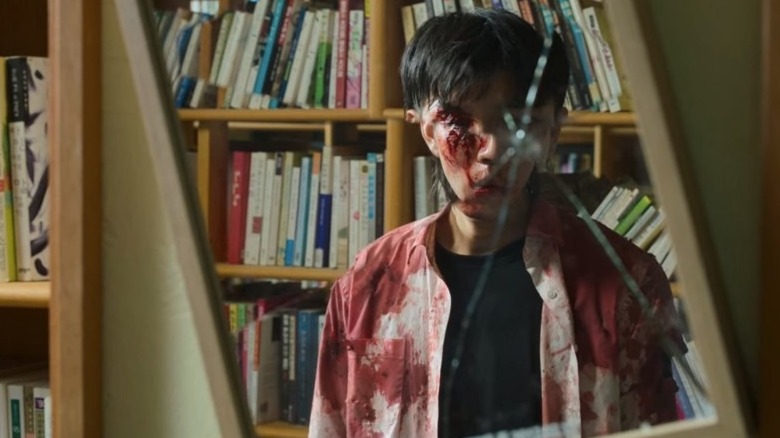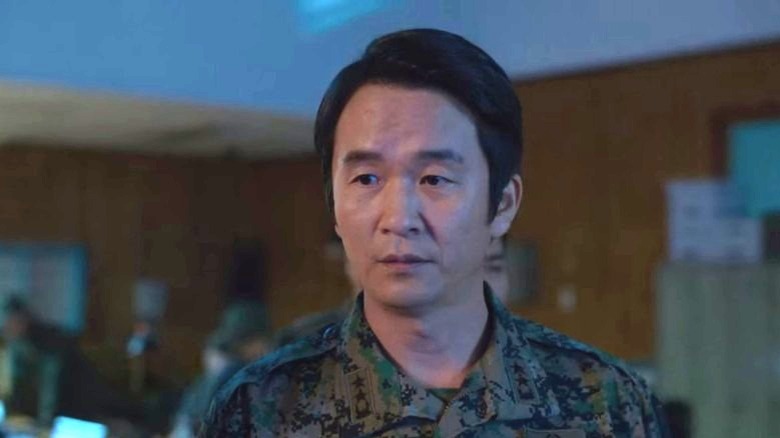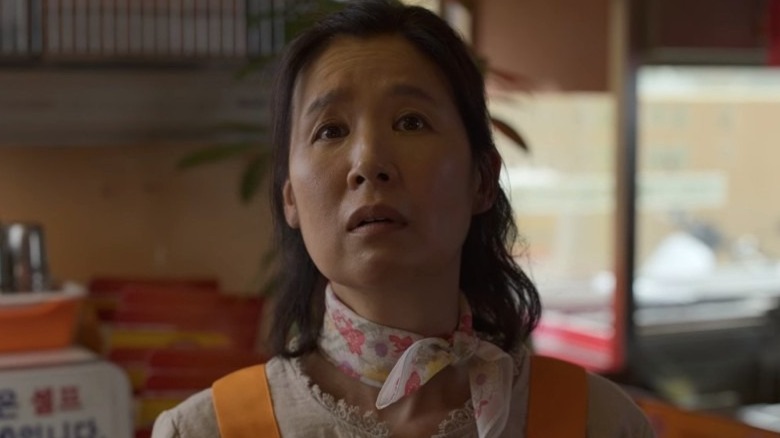Breaking Down The Ending Of All Of Us Are Dead
"All of Us Are Dead" is a relentless, tour de force zombie drama. A group of Hyosan High students face the end of the world and learn to rely on each other to survive. With humanity on the brink of collapse, they must navigate not only swarms of flesh-eaters but the brutal reality that no one else is equipped to save them. Beneath gory, heart-pounding layers throbs a heartfelt story about humanity, integrity, friendship, and boundless love. Based on a popular Webtoon comic, the South Korean TV series (co-directed by Lee Jae-kyoo and Kim Nam-su) is unlike most zombie-centric offerings. It frequently veers away from the predictable and dishes up extraordinary, unthinkable storytelling decisions.
Throughout all 12 episodes, each as tense as the next, the characters' own personal stories and revelations intertwine with much grander, more universal themes. Additionally, the potential cure for the outbreak looms like a mysterious specter and is only revealed towards the tail end of the season. Along with deep insights into society's deterioration, Gen Z trauma, questions of fear, and what this all could mean for a second season, this question is answered.
The cure
The primary mystery throughout the show's inaugural season revolves around the zombie virus. Created by biology teacher Byeong-chan (Kim Byung-chul) in a morally questionable attempt to make his son more courageous, the Jonas Virus has a cure. Or so Byeong-chan claims. On his laptop, he has documented the virus from inception to failed attempts to control it — along with what he purports to be the cure to save humanity.
Police investigator Jae-ik (Lee Kyu-hyung) takes him at his word and reveals this tidbit to local authorities. The military then launches a mission to retrieve the laptop at Hyosan High. In Episode 9, a helicopter heads to the school and hovers nearby. On-jo (Park Ji-hu), Cheong-san (Yoon Chan-young), and the group have taken refuge on the roof and look on, hopeful that they're finally being saved. Armed soldiers scale the side of the building and make their way to a zombie-infested classroom to seize the laptop. Their mission also includes rescuing any survivors. But at the last minute, commander Seon-moo (Rich Ting) receives word that some of the infected are asymptomatic. He requests the team to abort, leaving the group stranded on the rooftop.
Seon-moo sifts through countless videos and discovers the only way to cure the virus outbreak is to exterminate those infected. Bombs are dropped, and seemingly, all the rotters are destroyed. Seon-moo's story takes an unexpectedly tragic turn when the weight of what he's done is too much to bear, and he shoots himself in his office.
Hyosan quarantine
The group, which includes On-jo, Su-hyeok (Park Solomon), and Ha-ri (Ha Seung-ri), ultimately finds safe haven. As we learn in a four-month time skip, the military has created a self-sustaining community. With so many variables surrounding the virus still unclear, authorities believe the best option is to keep former Hyosan residents under a semi-permanent lockdown until further notice. The city itself has been under strict martial law since the initial outbreak, but the government is convinced that the pandemic has ended and lifts all measures.
During quarantine, On-jo grows anxious about their current state of living. She spends many nights slipping out and over a chain-link fence and ventures into the desolate cityscape. It's an act of rebellion that concludes her character arc. Through the loss of her best friend, Cheong-san, and her father, So-ju (Jeon Bae-soo), she learns what it means to survive. She's no longer the mousy and unsure student. She's grown into a strong-willed heroine who is more than capable of taking care of herself.
One evening, her friends discover these trips and decide to accompany her on an excursion. As she tells the group, she's seen a fire almost every night on the Hyosan High rooftop and wants to dig further into who is behind it. Together, they return to the roof and find a roaring blaze. It's then that they discover Nam-ra (Cho Yi-hyun) is still very much alive and living off the streets.
Nam-Ra and the halfbies
Nam-ra provides the most exciting element for forthcoming seasons. In her conversation with the group, she reveals that there are many more halfbies 一 human-zombie hybrids 一 feeding in and around the city. This reveal suggests they likely will come in handy when the outbreak inevitably resurges, and the military proves ineffectual against the new wave of the virus.
We're introduced to this viral mutation in Episode 5. During a fight in the library, Cheong-san shoves Gwi-nam (Yoo In-soo) into a pit of zombies, and he's eaten alive — but he doesn't die. Instead, Gwi-nam's DNA fuses with a zombie's, and he becomes almost god-like in his ability to effortlessly navigate through the hallways. In the following episode, Nam-ra is bitten by Gwi-nam, and her body reacts in the same way. Meanwhile, another student Eun-ji (Oh Hye-soo) also transforms and wields her new powers with abandon.
Hunkered down in a classroom, the group discusses the danger of harboring Nam-ra. "She isn't completely a zombie," stresses Dae-su (Im Jae-hyuk), who then suggests the new "halfbie" label. He's only half-joking, but the name sticks.
As we witness throughout the season, Nam-ra proves to be an essential weapon in combating villainous halfbies like Gwi-nam. Halfbies are far stronger, able to withstand more damage, and can spread the virus more quickly. In Season 2, this development could supply thrilling character dynamics and endless possibilities in terms of a bigger story.
Eun-ji: victim to antihero
When we first meet Eun-ji, she is being harassed and stripped by Gwi-nam, who also forces Chul-soo (Ahn Ji-ho) to film the entire incident. Gwi-nam has plans to upload the embarrassing video online and cause both parties even more humiliation. Later, Eun-ji climbs to the Hyosan High rooftop, and Chul-soo tries to pull her back from the ledge. Moments before she leaps, the zombie outbreak erupts.
Eun-ji is still reeling from her trauma and decides to retrieve cell phones from one of the classrooms. Chul-soo refuses to tag along, expressing how it's a fool's errand. Broken and betrayed, Eun-ji ventures down into the bowels of the high school and gets overtaken by a group of zombies. Instead of turning completely, she becomes the first halfbie we see in the show. She's initially taken aback but discovers that her newfound strength gives her agency over her body. Eun-ji represents many of the show's blurred moral lines. You root for her despite some ethically questionable decisions (like slaughtering the former guidance counselor who ignored previous pleas for help).
Throughout the season, Eun-ji shifts from downtrodden victim to resilient and brave antihero. Once she's taken to the military base, she confronts Chul-soo and bites him in the neck, exacting her revenge. The season closes with her fate remaining unclear. Presumably, she is still inside the medical facility. This sets up the exciting possibility of her eventual escape in Season 2.
On-jo: Gen Z survival
"I won't ask adults for anything ... ever again in my life," laments On-jo. In the finale, she has been detained for questioning by the military. In a quick montage, the surviving students reveal their feelings about what happened. The show positions On-jo as one of several central characters, and it isn't until Episode 11, when she loses her father and Cheong-san, that she fully emerges as the main protagonist.
On-jo's arc is the most interesting. She begins the season as an uncertain, deeply-flawed person, and it takes many episodes for her to firmly grasp reality. The loss of her childhood friend, I-sak (Kim Joo-ah), in Episode 2 is her first brush with tragedy, serving as a catalyst for her evolution throughout the season. Her journey is completed with her powerful words, and she becomes a strong emblem of Gen Z.
When the military abandons the group in Episode 9, On-jo begins to understand. Suffering has been forced upon them all by the older generation, and their situation is born out of the broken system they've inherited. Previous generations allow these cycles to repeat, but the blame rests on Gen Z's shoulders. By the finale, On-jo has emerged truly enlightened. This is why she ventures outside the military base's walls every night. It's a quest for truth — Gen Z's truth.
Sacrifice in tragedy
Sacrifice and humanity's limits are important themes in the show. As in the case of Cheong-san and On-jo's father, So-ju (Jeon Bae-soo), the best characters are those who display unwavering loyalty to one another and are willing to pay with their lives. These two characters represent the moral center of the group and approach their ends through very different means.
So-ju spends the entire season on a mission to save his daughter. From the outset, he already possesses the focus and the courage to challenge established institutions such as the military and government. In Episode 3, he scales the outer walls and flees to the shoreline where he plunges into its depths and swims onward. His will can not be deterred. Even after he's bitten in Episode 11, he uses his last moments to save the group.
Cheong-san lies at the opposite end of the spectrum. He doesn't challenge authority — at least not at first. When he witnesses Gwi-nam killing the principal, he films the murder and promises to show the police. He clings to the old world, but in the apocalypse, these institutions mean little. It's only through a barrage of tragedies, from losing Gyeong-su to constant zombie attacks, that his moral resolve thickens, and he sacrifices himself to defeat Gwi-nam.
So-ju and Cheong-san are two sides of the same virtuous coin. Without them, "All of Us Are Dead" wouldn't have the same emotional punch.
The art of friendship and chosen family
With the world crumbling around them, each character contends with the loss of parental figures in some way. Ji-min (Kim Jin-young) discovers her parents' death when the group uses a drone to scope out the school and surrounding area, Cheong-san's mother is bitten while on her way to the school, and On-jo witnesses her father get eaten alive.
The students quickly learn that family often means much more than mere blood relations. Their bonds of friendship spring from shared trauma, inspiring them further to look out for each other and go the distance when it matters most. Many characters, such as Su-hyeok (Park Solomon), prove their loyalty on countless occasions. Su-hyeok scales the school alongside Cheong-san on a mission to find a cell phone to call for help.
Despite opposing personalities, Ha-ri strikes up a friendship with Mi-jin (Lee Eun-saem). This unlikely connection is a direct result of the zombie outbreak. In pre-apocalypse times, they would never have been friends. Ha-ri is an ambitious, determined archer, whereas Mi-jin uses fang-toothed cynicism to conceal her fears. Together, they balance each other out.
Deterioration of humanity
The two central villains, Gwi-nam and Na-yeon, represent the deterioration of human existence in contrasting ways. As the modern world falls, people react differently. Many, such as On-jo and Cheong-san, keep a firm grip on their sense of morality, while others funnel their anger, self-loathing, and pain into questionable actions.
When we first meet Gwi-nam, he is consumed by anger and lacks any real empathy for others. He's the Hyosan High bully, and his moral boundaries have long since dissolved. It stands to reason that within an apocalyptic setting, he would naturally become a villain. He transforms into a vengeful halfbie. Some villains are made by trauma endured in the apocalypse, but those like Gwi-nam are molded by the world before. We don't get much insight into where his rage stems from, and it's not particularly necessary for the story.
On the other hand, Na-yeon acts out her fear of the poor and impending death in ways that mark her as a villain. We don't get to see her redeem herself, per se, but she does attempt to rectify a little of the damage she did in killing Gyeong-su. As we witness throughout the first season, most characters make dubious decisions as an emotional response to their surroundings. Na-yeon and (to a lesser degree) Ji-min make rash choices that have resounding, irreversible effects on the group.
Fear of the unknown
Military commander Seon-moo uses both rational thought and emotion to make his decisions. As he faces the zombie outbreak, he must decide the fate of the entire Hyosan area pretty quickly. When he learns the cure is on Byeong-chan's laptop, he sends out a helicopter to Hyosan High to retrieve the potentially humanity-saving device.
After a successful mission, the frontline soldiers start saving the students, but Seon-moo receives news that Eun-ji, an asymptomatic halfbie, has killed Chul-soo. He immediately orders the soldiers to massacre the students. Fortunately, the lead soldier doesn't follow these instructions and leaves the group alive. Seon-moo's declaration calls into question his integrity. His decision is made out of fear, of course, but this move further disheartens the group.
Later, Seon-moon watches a video clip in which Byeong-chan reveals that the only way to cure the virus is to contain and eradicate all those infected. Drones are deployed throughout the city, corralling the zombies to various abandoned buildings. Bombs are dropped, and in his guilt, Seon-moo shoots himself.
Eun-ji's best friend, Chul-soo, also bullied by Gwi-nam, has his own moment of fear as well. In Episode 7, he locks the door to the high school rooftop, and the group is unable to escape a horde of zombies. As a helicopter scoops him to safety, Chul-soo looks back and sees the students waving and screaming. In one of the season's cruelest moments, he doesn't acknowledge what is happening.
The working class
Amidst all the chaos and emotional turmoil, the show comments on the class divide. Apart from Na-yeon's character, the struggle within the working class is represented by Cheong-san's mother (Lee Ji-hyun), the owner-operator of a restaurant in downtown Hyosan. She's a hard worker and always does right by her son and his friends. But like so many around her, she is a victim of a broken system.
When she catches news of the zombie outbreak, she beelines for the high school and is met by a police barricade. She eventually makes her way through the streets and arrives at the sports field surrounding the high school. She spots one of her son's classmates and calls out to him, but unfortunately, he's already turned. Her screams alert a group of zombies, and she's eaten alive. Her good nature just isn't enough to save her.
Assemblywoman Eun-hee (Bae Hae-sun) gets caught in the zombie plague early on. Along with her senior aide, she makes it to the rooftop of a government building and is rescued. When she is taken to the safe zone, she assumes she'll be treated in the privileged manner her position has always entailed, but her status doesn't mean much anymore. Pre-apocalyptic political and social structures are destroyed, and many characters struggle to accept this new reality.
